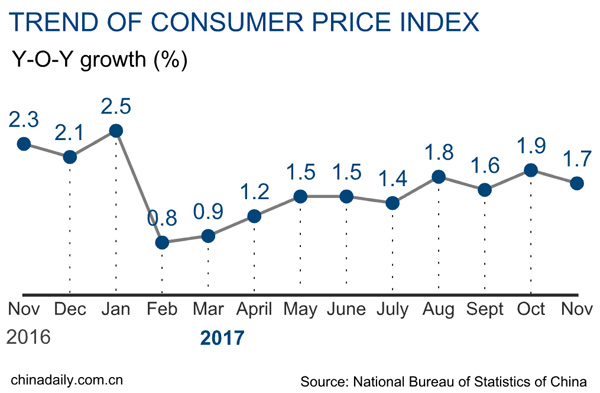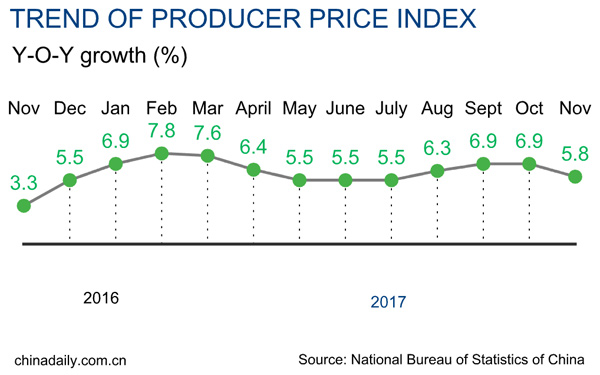China's CPI, PPI up 1.7%, 5.8% in November


BEIJING — China's consumer inflation slowed more than expected to grow 1.7 percent in November driven by falling food prices, the National Bureau of Statistics (NBS) said Saturday.
The consumer price index (CPI), a main gauge of inflation, rose 1.7 percent year-on-year in November, down from October's 1.9 percent, and missing market forecast of 1.8 percent.
The CPI has grown at less than 2 percent rate for 10 straight months, pointing to mild inflation in the world's second largest economy.
NBS statistician Sheng Guoqing attributed the slowdown in CPI to a decrease in food prices which account for a significant part of the CPI calculation.
Food prices fell 1.1 percent in November year-on-year, 0.7 percentage points more than the decline registered in October. Pork prices slumped 9 percent, dragging down the CPI growth by 0.25 percentage point.
On a month-on-month basis, food prices fell 0.5 percent. Prices of pork, aquatic products and fresh vegetables declined on abundant supply. Costs of beef, lamb, egg and fresh fruits rose on rising demand.
Non-food prices edged up in November on both yearly and monthly basis.
Non-food costs rose 2.5 percent year-on-year, 0.1 percentage point higher than the increase posted in October. The costs of health-care, housing and culture and entertainment led the gains.
On a monthly basis, non-food prices gained 0.1 percent. Fuel and diesel prices rose more than 3 percent. Garment costs increased 0.7 percent.
China's producer price inflation tamed down in November on low basis and government curbs on polluted industries, the National Bureau of Statistics (NBS) said Saturday.

The producer price index (PPI), which measures costs for goods at the factory gate, rose 5.8 percent year-on-year in November. It was down from a growth of 6.9 percent recorded in October, on par with market forecast.
On a monthly basis, it was up 0.5 percent. In the first 11 months, PPI climbed 6.4 percent from one year earlier.
As northern China enters into winter heating season, the government has increased efforts to tackle smog, asking steel mills and smelters to halt production to curb pollution. Those measures cooled demand for industrial raw materials.
Compared with a month ago, factory-gate prices gained faster in oil and natural gas developers and ferrous metal producers. Costs increased at slower pace in oil processing and chemical producing industries, NBS senior statistician Sheng Guoqing noted.
Compared with a year ago, raw materials costs rose 7.5 percent, 1.5 percentage point down from that recorded in October.
The PPI figures came alongside the release of the consumer price index, which rose 1.7 percent year-on-year in November, down from October's 1.9 percent, and missing market forecast of 1.8 percent.




































